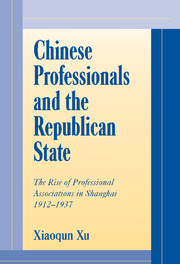 Chinese Professionals and the Republican State
Chinese Professionals and the Republican State Book contents
Part III - Professionalism, Nationalism, and Politics
Published online by Cambridge University Press: 07 September 2009
Summary
As this study has shown, in a fundamental sense, Chinese professionals were products and beneficiaries of modernization, which entailed two related processes – (1) modern state building and (2) professionalization. Professionals distinguished themselves from other social groups in pursuing their interests and purposes particular to their status as practitioners of modern professions, while contributing, and claiming to contribute, to state building and the public good. The state also treated professions and professional associations primarily from this perspective. The process of professionalization thus fundamentally conditioned the relationship between professionals and the Republican state. That was the first element in the dynamics of interaction between the state and professions.
A second element in the dynamics was the rising nationalist sentiment and movement against foreign privileges or foreign aggression during the period under study. Nationalism, loosely defined, simply provided one more imperative for professionals to act in the public arena. Where foreign privileges affected their own interests, professionals conveniently utilized the nationalistic rhetoric to advance their cause and to enlist the support from and cooperated with the state. Where the state failed to act to resist foreign aggression, professionals joined the general public to demand the state to face its task. In so doing, professionals and their organizations inevitably became politicized.
- Type
- Chapter
- Information
- Chinese Professionals and the Republican StateThe Rise of Professional Associations in Shanghai, 1912–1937, pp. 157 - 160Publisher: Cambridge University PressPrint publication year: 2000


